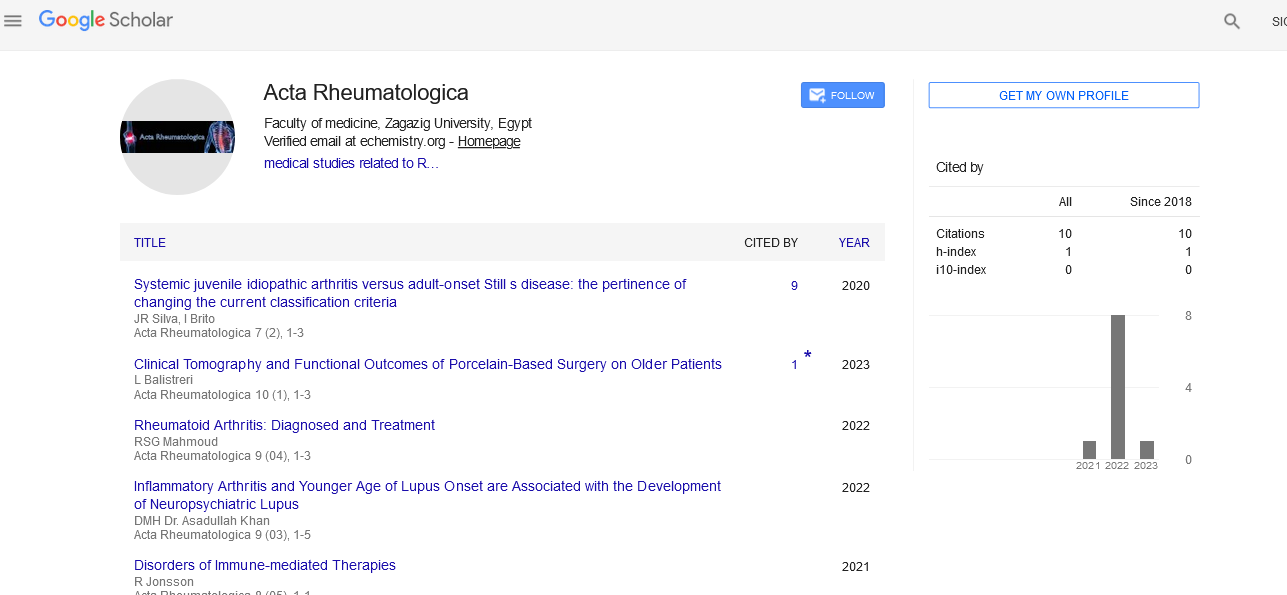Perspective - (2024) Volume 11, Issue 4
Unlocking the Secrets of Immunology: How Our Body Defends Itself
Yiping Jiang*
Department of Immunology, Tianjin Medical University. Tianjin, China
*Correspondence:
Yiping Jiang, Department of Immunology, Tianjin Medical University. Tianjin,
China,
Email:
Received: 14-Jul-2024, Manuscript No. IPAR-24-15056;
Editor assigned: 17-Jul-2024, Pre QC No. IPAR-24-15056 (PQ);
Reviewed: 31-Jul-2024, QC No. IPAR-24-15056;
Revised: 09-Aug-2024, Manuscript No. IPAR-24-15056 (R);
Published:
19-Aug-2024
Introduction
Immunology, the study of the immune system, is a realm
where the marvels of our body's defenses against diseases
unfold. From understanding the intricate mechanisms of
immunity to developing groundbreaking therapies, the field of
immunology plays a crucial role in both medicine and biology. In
this article, we delve into the fascinating world of immunology,
exploring its key components, recent advancements, and future
directions.
Description
The basics of immunology
At its core, immunology revolves around the immune system,
a complex network of cells, tissues, and organs working tirelessly
to protect our bodies from harmful invaders such as bacteria,
viruses, fungi, and parasites. The immune system's primary
objective is to distinguish between self (the body's own cells)
and non-self (foreign substances or pathogens) and to mount a
defense against anything it recognizes as a threat.
Components of the immune system
The immune system can be broadly categorized into two main
branches: The innate immune system and the adaptive immune
system.
Innate immune system: This is the body's first line of defense,
providing immediate, nonspecific protection against a wide
range of pathogens. It includes physical barriers like the skin and
mucous membranes, as well as immune cells such as
macrophages, neutrophils, and natural killer cells.
Adaptive immune system: This system provides a more
targeted and specific response to pathogens. It consists of T cells
and B cells, which are lymphocytes that can recognize specific
antigens (molecules on the surface of pathogens). The adaptive
immune system has a remarkable ability to "remember" past
infections, providing long-lasting immunity through the
production of antibodies and memory cells.
Key players in immunology
Antibodies: Y-shaped proteins produced by B cells that bind to
specific antigens, marking pathogens for destruction by other
immune cells.
T Cells: Responsible for coordinating the immune response and
directly attacking infected or abnormal cells.
Cytokines: Signaling molecules that mediate communication
between immune cells, regulating the intensity and duration of
immune responses.
Major Histocompatibility Complex (MHC): Proteins that display
antigens on the surface of cells, crucial for T cell recognition and
activation.
Recent advances in immunology
In recent years, immunology has witnessed groundbreaking
discoveries and technological advancements that have
revolutionized our understanding and treatment of diseases:
Immunotherapy: This approach harnesses the power of the
immune system to treat diseases such as cancer and
autoimmune disorders. Techniques like checkpoint inhibitors and
CAR-T cell therapy have shown remarkable success in clinical
trials.
Vaccine development: The COVID-19 pandemic highlighted
the importance of vaccines in preventing infectious diseases.
Rapid development and distribution of vaccines against SARS-CoV-2 showcased the agility of immunology in responding to
global health crises.
Precision medicine: Advances in genomics and bioinformatics
have enabled personalized treatments that target specific
immune pathways and genetic factors, optimizing therapeutic
outcomes for individual patients.
Microbiome research: The microbiome, comprising trillions of
microbes living in and on the human body, plays a crucial role in
immune function. Understanding these interactions offers new
insights into disease mechanisms and potential therapeutic
targets.
Challenges and future directions
Despite remarkable progress, immunology faces several
challenges, including autoimmune diseases, immunodeficiencies, and the rise of antimicrobial resistance. Future research aims to
tackle these issues through:
Advanced immunomodulation: Fine-tuning immune responses
to achieve balanced immunity without causing harmful
inflammation or autoimmune reactions.
Next-generation vaccines: Developing vaccines that provide
broad-spectrum protection against multiple strains or rapidly
mutating pathogens.
Artificial intelligence: Harnessing AI and machine learning to
analyze vast amounts of immunological data, uncovering new
biomarkers and therapeutic targets.
Global collaboration: Addressing global health disparities and
ensuring equitable access to immunological therapies and
interventions worldwide.
Conclusion
Immunology stands at the forefront of scientific discovery,
offering profound insights into the mechanisms of health and
disease. From understanding basic immune functions to
developing cutting-edge therapies, the field continues to expand
our knowledge and improve human health. As researchers and
clinicians push the boundaries of what is possible, the future of
immunology holds promise for transformative breakthroughs
that will shape the landscape of medicine for years to come.
Citation: Jiang Y (2024) Unlocking the Secrets of Immunology: How Our Body Defends Itself. Acta Rheuma Vol:11 No:4





